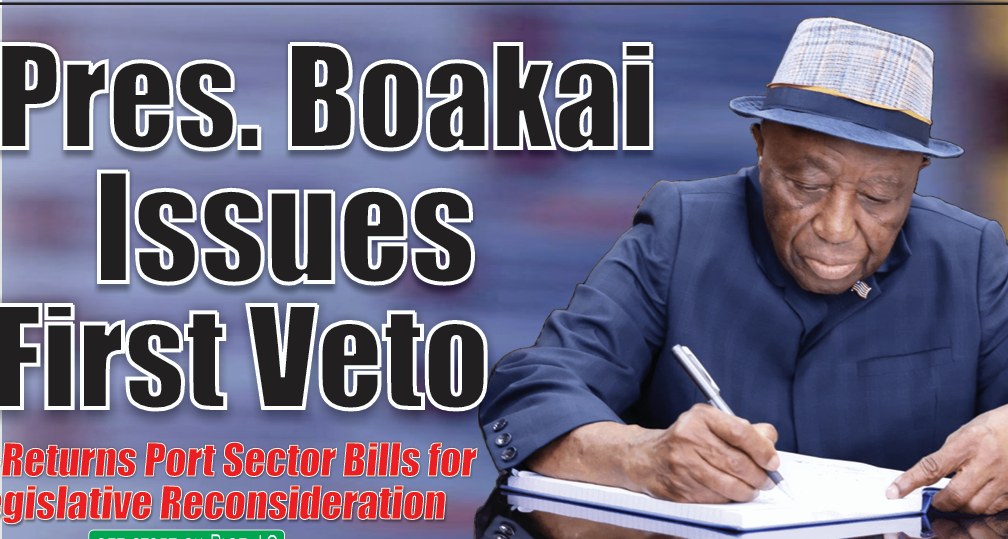Editorial:Pres. Boakai's First Veto Signals Commitment to Orderly Reform in Liberia’s Port Sector

President Joseph Nyuma Boakai’s decision to return two key Senate enrolled bills the Liberia Ports Authority Act (Senate Bill No. 4) and the Liberia Sea and Inland Ports Decentralization and Modernization Act (Senate Bill No. 5) marks a defining moment in his administration’s approach to governance and legislative scrutiny. Issued on July 15, 2025, President Boakai’s first veto was guided by Article 35 of the Liberian Constitution and reflects not merely a legal formality but a deliberate stance in favor of structural coherence, institutional integrity, and national interest. This measured action signals the President’s commitment to ensuring that reform efforts, however well-intentioned, do not compromise constitutional order or undermine existing mandates. The two bills, passed during the second session of the 55th Legislature, aimed to transform Liberia’s maritime and port infrastructure by decentralizing operations, creating autonomous management for the country’s four key ports Monrovia, Buchanan, Greenville, and Harper and establishing a new oversight body: the Liberia Sea and Inland Ports Regulatory Authority. Despite their aspirational goals, President Boakai raised substantive objections rooted in legal, administrative, and strategic concerns. Chief among them were glaring inconsistencies between the titles and content of the bills an issue that could lead to interpretive confusion and implementation difficulties. Even more critical was the apparent overlap and conflict with the statutory functions of the Liberia Maritime Authority (LiMA). The bills, if enacted in their current form, would effectively disempower LiMA, reducing its current regulatory scope and weakening a key institution without clear transitional mechanisms. Furthermore, the President flagged the dangers of excessive centralization within the proposed regulatory authority granting it unchecked power over port safety, tariffs, infrastructure, and even law enforcement functions. Such a concentration of authority not only violates principles of good regulatory practice but could jeopardize Liberia’s adherence to international maritime commitments. Section 409 of the Regulatory Bill was particularly troubling, proposing the dismantling of LiMA’s core responsibilities without adequate legal clarity. The decentralization strategy envisioned in Senate Bill No. 5 was also riddled with gaps: ambiguous definitions, a lack of harmonization with the existing NPA Act, and the creation of unwieldy nine-member boards for each port authority. Rather than solving existing problems, the proposed structure risked introducing new layers of bureaucracy, confusion, and inefficiency. By returning these bills for reconsideration, President Boakai has sent a clear message: reform must be thoughtful, balanced, and institutionally sound. His veto calls on the Legislature to refine the legal frameworks, consult key stakeholders including LiMA and return with revised legislation that truly strengthens the port sector while preserving national regulatory integrity. This moment sets an important precedent for the Boakai administration. It is not enough to pursue reform; it must be done responsibly. The President’s action affirms that expediency must never trump due diligence, and that visionary change requires a firm foundation in law, policy alignment, and administrative foresight. Now, the responsibility shifts back to the Legislature. Liberia’s lawmakers must rise to the occasion with renewed diligence, deeper consultations, and a shared commitment to building port systems that serve both national development and global credibility. President Boakai’s first veto was not a rejection of reform but a call to do it right.


